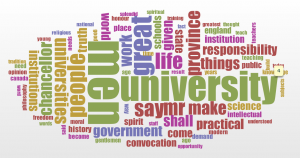Today I went to a meeting about Canadian Institute For Advanced Knowledge (CIFAR) in the hopes that they might have programs in the humanities. They do and they don’t.
One new initiative they have that is open to humanists is their global call for ideas. The call is open to anyone:
Do you have a question with the potential to change the world?
A number of their programs like Successful Societies, Social Interactions, Identity & Well-Being, and Institutions, Organizations & Growth seem to have humanists and social scientists involved, even if they aren’t issues central to the humanities.
In recognition of the absence of humanities programs they started a Humanities Initiative in 2009. Alas, it hasn’t yet developed any programs we could participate in. Here is some history:
In their 2009-2010 Annual Performance Report they state:
CIFAR organized a discussion with senior humanities researchers drawn from institutions across North America in May 2009 about the role CIFAR could play in supporting advanced research in the humanities. The meeting participants recommended the creation of an ad hoc Steering Committee that would undertake the process of identifying in detail how CIFAR should approach and support advanced humanities research. This Steering Committee met in December 2009, and following a telephone conference in April 2010 recommended that the Institute proceed with several pilot projects in the next year. Work on refining these projects and identifying task force members was underway by June 2010.
In a 2010, Final Report CIFAR Performance Audit and Evaluation, the evaluators note:
CIFAR’s Strategic Plan notes that the growth of its programs in the social sciences and humanities has not kept pace with growth in the natural sciences. CIFAR is, consequently, examining how its research model might be adapted to research in these disciplines with a specific focus in this five-year period on the humanities.
It is now 2013 and it seems the steering group recommended two pilot projects, neither of which seem to have done more than meet.
Pekka Sinervo, who presented here, suggested that it is hard to find examples of sustained conversations around a single question in the humanities of the sort that CIFAR supports. He challenged me to find examples they could use as models. Perhaps there isn’t a tradition of think tanks in the humanities? Perhaps senior humanists, of the sort CIFAR has recruited, are more solitary scholars who just can’t get excited about getting together to talk about ideas? Perhaps the humanities has lapsed into Cartesian solipsism – we think, we are, but alone.
I personally think CIFAR should restart and rethink their Humanities Initiative. If they are finding it hard to get humanists engaged in the ways other fields are, then try something different. I would encourage them to look at some examples from the digital humanities that have demonstrated the capacity to initiate and sustain conversations in innovative ways:
- The Humanities and Technology Camp (THATCamp) is an extremely successful example of an open and inclusive form of conversation. Mellon supports this initiative that supports inexpensive “unconferences” around the world.
- Networked Infrastructure for Nineteenth-century Electronic Scholarship Online (NINES) is a reinvented scholarly association that was formed to support old and new media research. This is not an elite exclusive community, but a reimagined association that is capable of recognizing enquiry through digital scholarship.
- The Day of Digital Humanities is a sustained look at the question, “Just what do digital humanists really do?” Started at U of Alberta in 2009, the latest version was run by Michigan State University’s MATRIX: The Center for Digital Humanities & Social Sciences. Other organizations have used this “Day of …” paradigm to get discussion going around issues like digital archaeology.
- 4Humanities is a loose group that looks at how to advocate for the humanities in the face of funding challenges. With minimal funding we support local chapters, international correspondents, and various activities.
In short, there are lots of examples of sustained conversations, especially if you don’t limit yourself to a particular model. Dialogue has been central to the humanities since Plato’s Academy; perhaps the humanities should be asked by CIFAR to imagine new forms of dialogue. Could CIFAR make a virtue of the problem they face around humanities conversations?
Can you start a dialogue with the potential to change the world?
